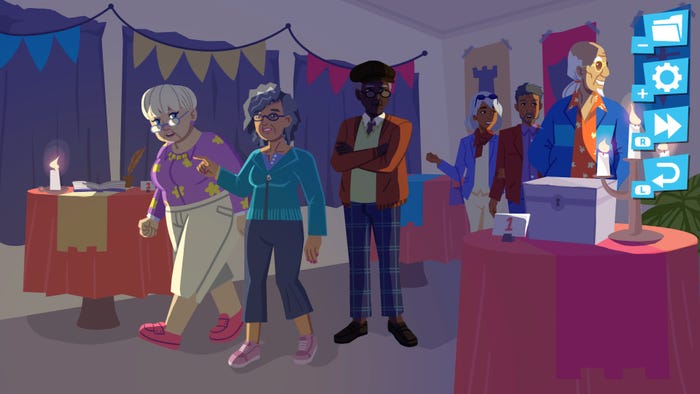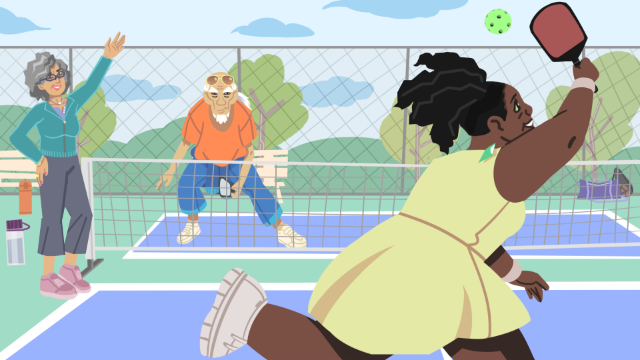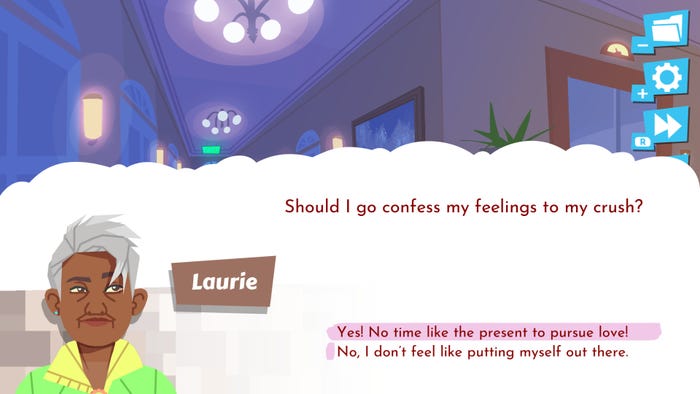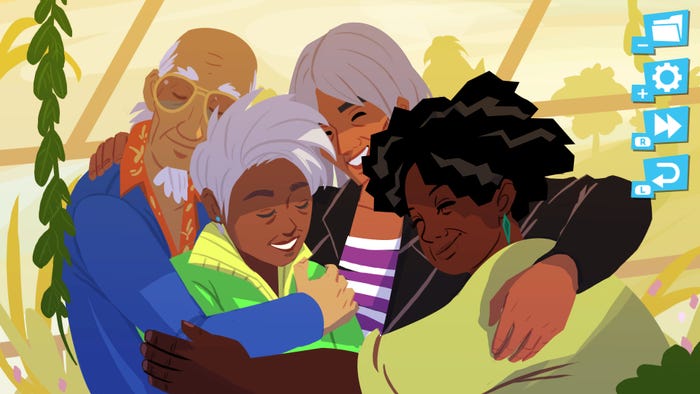Trending
Opinion: How will Project 2025 impact game developers?
The Heritage Foundation's manifesto for the possible next administration could do great harm to many, including large portions of the game development community.
Opportunities for love don't disappear after a certain age. They just look a little different.

Later Daters is a game about dating and companionship in a retirement community. It’s not some doom and gloom tale about romance at the end of your days, though; it’s an exploration of the passion, change, fun, and often-untold stories of life that happen as you’re experiencing your later years.
Game Developer sat down with the team at Bloom Digital Media, the creators of the game, to talk about the compelling storylines they were able to explore specifically because of their older cast, how they worked to tell realistic stories about dating as we age, and how creating the game helped them get in touch with family members and themselves in some surprising ways.
Later Daters is a game of retirement romance. What interested you in exploring dating life as an octogenarian? What inspired the creation of this title?
Miriam Verburg, executive producer: I have always been interested in stories that come from transitional periods. Our first game, LongStory, was about that very awkward time in a person's life when they realize there are so many different levels to friendship and romance—that they have the capacity to share love with people in a variety of ways and that they need to learn to communicate their desires and it's terribly embarrassing.
Usually, that time is around the early teen years, but as we worked on LongStory I also learned about something called Queer Time. The idea of Queer Time is that queer people (a cohort I identify with) don't always experience life milestones at the expected time. Having your life milestones arrive at the "correct" time is called Chrononormativity, a word that I love, and which as soon as I heard I was like, "OH I AM NOT CHRONO-NORMATIVE." It was like a bunch of little things fell into place for me. So, for example, I lost my hetero virginity in grade 10 and my lesbian virginity at age 20. That is fairly typical of a non-normative life milestone.
So, I became obsessed with telling stories that leave room to share how a person's life doesn't have to take place in a certain order and that life milestones are arbitrary and can repeat. I also realized how spurious and shallow a lot of reflection about milestones is: A "Forever Home" or my "Soul Mate." These ideas seem to coalesce around a fear of growth, change, renewal. I wanted to make a game about how even the most committed couples in the world change over and over again in the fabric of their lives. That non-normative chronology is the norm, ironically.

Image via Steam.
What sorts of topics felt important to cover in the story that don't usually get covered in romance simulators? Did it feel like you could address different topics and personal stories while focusing on seniors with your game?
Heather Jackson, narrative director: People over 60 have so much life experience; it really opened up a wealth of story ideas! We were definitely able to explore topics we couldn’t if the characters were younger. Not just because of their age but because of their generation. For example, one of the characters in Later Daters had a same-sex partner he was never able to publicly or legally declare as his partner. We explored how painful a loss is when others can’t, or won’t, recognize who that person was to you.
More generally, one aspect of relationships that you don’t see in dating sims starring younger characters are people who are dating again not because of a breakup but because of a death. And not a dramatic death, like a murder or car accident, just a natural old-age death. It’s a very different place to be in when dating, and about half our cast was in this place, but all were dealing with it in different ways. I think that was really interesting.
Verburg: I think a major part of exploring this life stage was figuring out what love feels like when you are closer to the end of your life than in the beginning of it or the middle. A lot of the narrative focus was on how each character understands and expresses their feelings related to love and mortality, without (as you point out) that depressing, patronizing lens that makes it seem like older people are just sitting around feeling sad about death or otherwise being in complete denial. Most older people I spoke to as part of this research had already had significant experiences with loss and grief, and it was interesting to see how those experiences had changed their philosophy toward how they wanted to share their love and make friendships and partnerships.
Many works about seniors can be depressing, dark, and patronizing. What ideas went into your work to avoid getting into tired stereotypes and bleak tales while still respectfully and realistically talking about people as they grow older? How did you create something empowering without glossing over the challenges that come near the end of life?
Jackson: One thing that went into this game to avoid tired stereotypes was talking to real-life seniors about their lives! On a more personal level, for me, it was imagining myself in the situation. I’d been with my partner for a decade when we were making Later Daters, and although that doesn’t seem long in the grand scheme of things, it’s my longest relationship. I pictured what it would be like to be elderly and without him.
Yeah, I cried. But if you don’t feel uncomfortable things, you can’t write about them. I had to go there, picture myself and my friends in the retirement home, make it as personal as possible. And I think that’s the key to respectfully creating realistic characters—you’ve got to feel like you’ve met them in real life. And if they’re real people in your life, you’ve got to do their stories justice—and let them have some fun!
Verburg: As Heather pointed out: lots of research! I spent lots of time chatting with older members of my family, as did the entire team. We also watched media that featured older people to get a sense of what we liked and didn't like, and in particular, what stories seemed to be verging on the parodic. One story in particular we wanted to avoid was 'older people fall in love and have a beautiful montage of a relationship and then one of them tragically dies' that felt like the most tokenistic representation, mostly because it sticks to this Romeo and Juliet format of love where it has to sweep people off their feet and end tragically.
In our research, it certainly seemed that older people are much more realistic about their love, and while they love deeply, they are often very self-sufficient and have wide networks of support that are equally important and take up a fair amount of their time. It is less likely that two older people will fall into an all-consuming love affair and then grieve tragically when one or the other of them dies, and it is quite frankly the least interesting version of a love story you can tell about senior citizens.

Image via Later, Daters website.
What thoughts went into creating your cast of sexy seniors, visually and narratively?
Jackson: Narratively, I tried to think of all the various ways one could end up single in a retirement community. I didn’t want everyone to be a widow. So often, elderly people are thought of in relation to their partner, deceased or not. What if someone never had a life partner? What if that was their choice and not some sad story? Most importantly, the desire to connect with others, romantically and sexually, doesn’t disappear as you age.
MJ Lyons: Authenticity. I remember sitting around brainstorming for Blair, the rat king, talking about our experiences with old people who were living unapologetically. We had lots of funny stories about our relationships with older people because there is a lot of stuff that straddles the line between humiliating and humorous about aging.

Image via Later, Daters website.
What sort of research went into capturing the retirement life in this game? What personal stories informed it?
Jackson: My parents spend their winters in a retirement community in Texas, and although they are not in the dating scene, they’re a wealth of information about what seniors do in these communities. The big one for them was this new sport called Pickleball. Everyone they knew had started playing! It’s a funny sport with some truly ridiculous terminology; “dink it in the kitchen” is an actual move. The jokes for the Pickleball scene wrote themselves! When Later Daters came out, Pickleball was still pretty obscure, but now it’s mainstream. So, thanks to my mom and dad for giving me the drop on the hottest new sport in senior communities and beyond!
Verburg: I had some great chats with my aunt about her life after a 30-year marriage and her experience of dating post-65. It was really eye-opening, and luckily, my aunt was also willing to spill tea about a few of her friends so I heard about a wide variety of dating strategies.
I also tried to speak to my friend's dad, who had joined an over-65 singles organization after his wife died, and it turned out he had started dating the singles group organizer, who was both very protective of her new beau and unwilling to share her name for fear of being ousted from her role as chair of the singles group. So, like I said, there are layers to the dating scene post-65.

Image via Steam.
What thoughts went into creating a story that allowed for many kinds of connections and romantic options and letting players find various relationship styles that would feel right for them?
MJ Lyons: [We wanted to include poly options] because it is a form of relation that has existed for a while, but it seems to be having a moment in public consciousness.
Shel Kahn, art director: There is less representation of elder romance, so it opened up the potential to create a more diverse approach and representations of love and relationships in elderly populations.
Jackson: Having a cast of older people definitely made it harder to come up with story arcs that resonated because there is no typical story arc for people when they age. With LongStory, there was a typical story arc for teenagers.
Verburg: There is so much still left untold in terms of stories about love that are not focused on the first love, or the first few years of a loving relationship. Honestly, one of the best portrayals of an elderly couple making it work remains Billy Crystal and Carol Kane as Miracle Max and Valerie from The Princess Bride. The past few years have seen lots of improvement in terms of media that shows seniors in key roles. Grace and Frankie was a real groundbreaker in that regard, as well as The Kominsky Method and Going in Style.
With games, there is Old Man's Journey and Cribbage with Grandpas. I mean even The Bachelor has hopped on board, so there is definitely a zeitgeist right now, but there is lots of catching up to do when you consider for how long human interest stories have focused on the part of love that focuses on firsts.
MJ Lyons: That was one of the joys of Later Daters. The characters came to the table with so much of their life already lived, and it is interesting to find a way to represent that depth in a short series of episodes.
What appealed to you about letting players explore dating and retirement life? Why do you feel it is important to let players immerse themselves in these stories? How do you hope that it affects them?
Jackson: We’re all going to grow old, hopefully! If we’re lucky, this will be us one day. And games are all about exploring what you could become! So, in that sense, who wouldn’t want to play a dating sim set in a retirement home? Let’s look forward to our golden years rather than dread them.
How do I hope it affects players? It often seems as if elderly people aren’t treated as people anymore. They’re just bodies that need to be taken care of. And that’s sad. If this game can do anything, I want it to show that people over 60 are as fun, interesting, complicated, and sexy as younger people.
Verburg: I really want this game to give players a chance to imagine themselves with lots of time to figure things out. We never know how much time we have, but I think lately there has been increasing pressure to have achieved a lot by a young age. I think that is a pernicious form of ageism—that love, success, creativity, and change can only happen before 30, and then you "settle down," have some kids, and never change again. I wanted to make a game about how much that isn't true and create a compelling cast of characters to share their journey with players so we can start to imagine our lives as being a big, challenging, and exciting canvas.

Image via Steam.
Were any of you affected in any surprising, unexpected, or touching ways through your work creating Later Daters? What positive things came from its development for you?
Jackson: Wow. There is something. While I was researching polyamorous relationships for Later Daters, I came across the term “greysexual” and, well, realized that’s what I was. And then I pitched a game idea about that to Miriam, and we got some funding for it, so stay tuned!
Verburg: My mom died when she was 56 and I was 25. Like my mom, I identify as a cis woman, and without her around, I have grown up without a person who I can talk to on the regular about what it feels like to be a woman in the 21st century. I had never taken the time to talk with my aunts about how they felt about growing older. In the guise of doing research, I ended up learning a lot about my aunts and their individual histories, and it ended up helping me grow closer to them, and have some idea of what growing older is going to feel like for me and now I have two people I can reach out to when I need some perspective. I can't begin to explain how much I treasure that.
Read more about:
FeaturesYou May Also Like